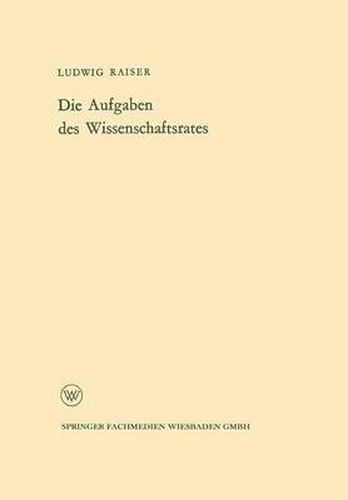Readings Newsletter
Become a Readings Member to make your shopping experience even easier.
Sign in or sign up for free!
You’re not far away from qualifying for FREE standard shipping within Australia
You’ve qualified for FREE standard shipping within Australia
The cart is loading…






This title is printed to order. This book may have been self-published. If so, we cannot guarantee the quality of the content. In the main most books will have gone through the editing process however some may not. We therefore suggest that you be aware of this before ordering this book. If in doubt check either the author or publisher’s details as we are unable to accept any returns unless they are faulty. Please contact us if you have any questions.
In view of the fact that for a modern nation the efficiency of its science has become a quest ion of existence, that German science has lost its former world rank, and that the severely divided forces working to overcome this loss need to be co-ordinated, the Bund and the Laender, through adminis- trative agreements, have created the Science Council, which commenced its work early in 1958. It consists of a committee of 39 members, divided into two chambers (the Administrative Commission and the Scientific Commis- sion) meeting also as an assembly several times annually. It has the function of a planning authority for the development of German science (including social sciences and humanities), responsible for the critical study and re- shaping of its organisation principles, the study of measures for the increase of its efficiency, and the study of proposals to national bodies for the most productive utilisation of financial and organisational aid. In its first three years of work the Science Council dealt initially with the improvement of existing universities and technical colleges and with questions of reconstruction, the results of which were published at the end of 1960 in the first volume of recommendations. This was followed in autumn 1962 with Suggestions for the Creation of new Universities , com- prising reform proposals to be adopted in the establishment of universities.
$9.00 standard shipping within Australia
FREE standard shipping within Australia for orders over $100.00
Express & International shipping calculated at checkout
This title is printed to order. This book may have been self-published. If so, we cannot guarantee the quality of the content. In the main most books will have gone through the editing process however some may not. We therefore suggest that you be aware of this before ordering this book. If in doubt check either the author or publisher’s details as we are unable to accept any returns unless they are faulty. Please contact us if you have any questions.
In view of the fact that for a modern nation the efficiency of its science has become a quest ion of existence, that German science has lost its former world rank, and that the severely divided forces working to overcome this loss need to be co-ordinated, the Bund and the Laender, through adminis- trative agreements, have created the Science Council, which commenced its work early in 1958. It consists of a committee of 39 members, divided into two chambers (the Administrative Commission and the Scientific Commis- sion) meeting also as an assembly several times annually. It has the function of a planning authority for the development of German science (including social sciences and humanities), responsible for the critical study and re- shaping of its organisation principles, the study of measures for the increase of its efficiency, and the study of proposals to national bodies for the most productive utilisation of financial and organisational aid. In its first three years of work the Science Council dealt initially with the improvement of existing universities and technical colleges and with questions of reconstruction, the results of which were published at the end of 1960 in the first volume of recommendations. This was followed in autumn 1962 with Suggestions for the Creation of new Universities , com- prising reform proposals to be adopted in the establishment of universities.